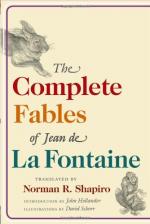THE GASCON
I am always inclined to suspect
The best story under the sun
As soon as by chance I detect
That teller and hero are one.
We’re all of us prone
to conceit,
And like to proclaim our own glory,
But our purpose we’re apt to defeat
As actors in chief of our story.
To prove the truth of what
I state
Let me an anecdote relate:
A Gascon with his comrade sat
At tavern drinking. This and that
He vaunted with assertion pat.
From gasconade to gasconade
Passed to the conquests he had made
In love. A buxom country maid,
Who served the wine, with due attention
Lent patient ear to each invention,
And pressed her hands against her side
Her bursting merriment to hide.
To hear our Gascon talk, no Sue
Nor Poll in town but that he knew;
With each he’d passed a blissful
night
More to their own than his delight.
This one he loved for she was fair,
That for her glossy ebon hair.
One miss, to tame his cruel rigour,
Had brought him gifts.—She owned
his vigour
In short it wanted but his gaze
To set each trembling heart ablaze.
His strength surpassed his luck,—the
test—
In one short night ten times he’d
blessed
A dame who gratefully expressed
Her thanks with corresponding zest.
At this the maid burst forth, “What
more?
“I never heard such lies before!
“Content were I if at that sport
“I had what that poor dame was
short.”
THE PITCHER
The simple Jane was
sent to bring
Fresh water from the neighb’ring
spring;
The matter pressed, no time to waste,
Jane took her jug, and ran in haste
The well to reach, but in her flurry
(The more the speed the worse the hurry),
Tripped on a rolling stone, and broke
Her precious pitcher,—ah! no
joke!
Nay, grave mishap! ’twere better
far
To break her neck than such a jar!
Her dame would beat and soundly rate her,
No way could Jane propitiate her.
Without a sou new jug to buy!
’Twere better far for her to die!
O’erwhelmed by grief and cruel fears
Unhappy Jane burst into tears
“I can’t go home without the
delf,”
Sobbed Jane, “I’d rather kill
myself;
“So here am I resolved to die.”
A friendly neighbour passing by
O’erheard our damsel’s lamentation;
And kindly offered consolation:
“If death, sweet maiden, be thy
bent,
“I’ll aid thee in thy sad
intent.”
Throwing her down, he drew his dirk,
And plunged it in the maid,—a
work
You’ll say was cruel,—not
so Jane,
Who even seemed to like the pain,
And hoped to be thus stabbed again.
Amid the weary world’s alarms,
For some e’en death will have its
charms;
“If this, my friend, is how you
kill,
“Of breaking jugs I’ll have
my fill!”
To promise
is one thing
to keep it, another




